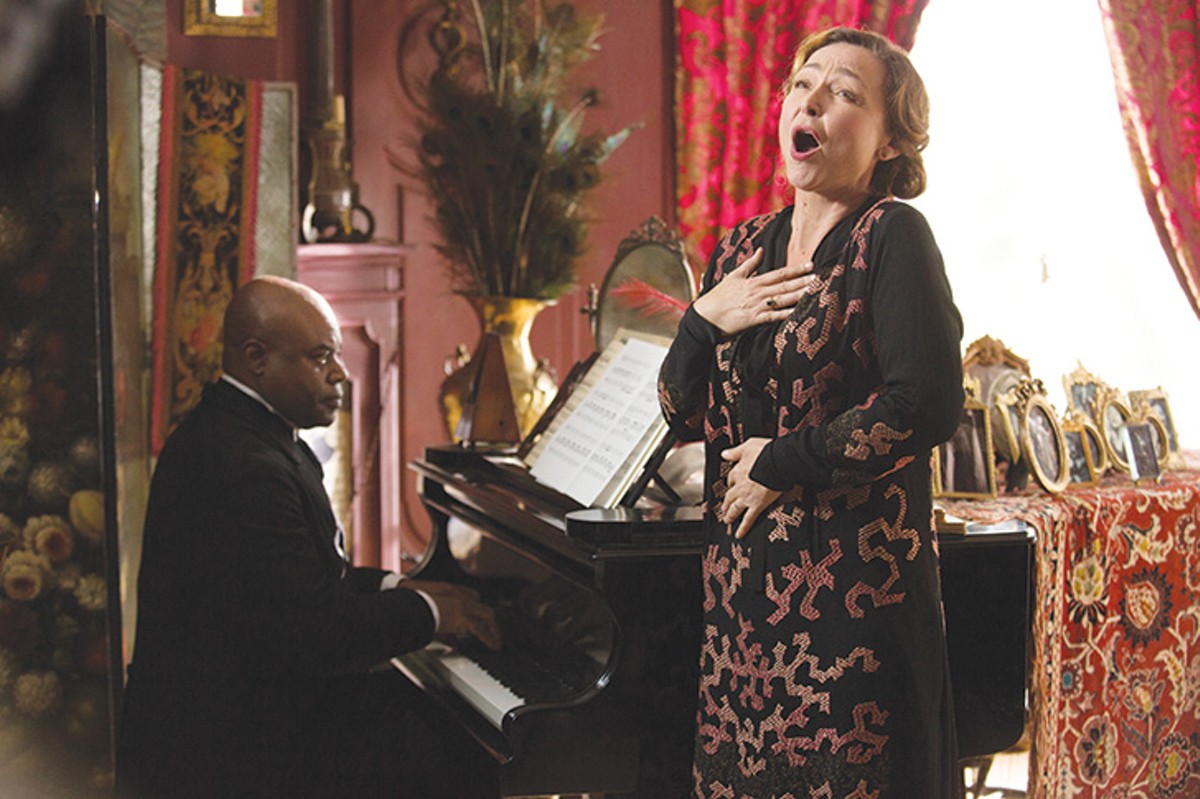It's hard to seriously consider the afflictions of the affluent, the follies of the filthy rich, the woes of the wealthy. It is one of our class weapons, a great equalizer, that we admonish them as spoiled, undeserving of sympathy due to their many luxuries.
The have-nots must secure some sort of capital to hold over the oppressor and that capital is our dismissal of their blues, their worries, troubles and woes. We poo-poo any one of their numerous and seemingly ridiculous concerns, cast them off as "First World problems." However, as Bob Dylan so eloquently stated, "We all wear the same thorny crown."
This is the hairy predicament in which Marguerite Dumont (Catherine Frot) finds herself. A wealthy baroness whose life of frivolity and refined etiquette has been ill-spent, her sole passion, besides capturing the attention of her unfaithful, emotionally removed husband Georges (André Marcon), being to become a celebrated opera singer.
Dumont spends her time listening to grandiose Victrolas — cornucopias spilling forth the plight of opera's most tragic characters — poring over the techniques and styles of the mastersingers and compositions of Europe's finest composers and librettists. She has rooms, halls in her majestic estate, devoted entirely to the delusion that she is a renowned opera singer — for her friends and the clubs and artists of which she is a respected patron, tell her so. Her faithful butler Madelbos (Denis M'Punga) regularly takes photographs of the lady of the house in costume, posed as if in the throes of an aria for one of the leading companies on the continent.
This is the profound revenge that the world plays upon this exceedingly wealthy and belligerently innocent French woman: Their avoidance of the terrible truth that Marguerite Dumont, based on the American socialite Florence Foster Jenkins (who Meryl Streep will portray in a forthcoming film of the same name), sings like complete shit.
Paradoxically, everyone that Marguerite meets and strikes up some sort of acquaintance with does so under the auspices of aiding her career, when, in fact, it is their position they seek to advance. From the opera critic Lucien Beaumont (Sylvain Dieuaide) and his anarchistic confidant Kyrill Von Priest (Aubert Fenoy), the former appeasing his conscience by giving Marguerite a true insider's peak into the world of opera and the latter heralding her caterwauling as a strike against the bourgeois formalities of modern art, proclaiming to the beloved Mandelbos, who keeps the charade alive in order to finish his photograph series of the Lady of the Estate. In fact, the loyal butler is the primary guardian of Marguerite's fantasy, constantly removing damaging articles in the paper and doing everything in his power to silence any critics; perpetuating the myth of Marguerite's gift.
Marguerite's position functions as a moral litmus test. Everyone that comes in contact with her has their convictions examined. The washed-up opera singer Atos Pezzini (Michel Fau), who is charged with taking on Marguerite as a pupil, experiences one of the most fascinating quandaries of the film: To toss aside his deep loyalty to his art and play along, being compensated handsomely but dragging his name through the mud as Marguerite's instructor, or staying true to his craft and sinking into impoverished, shameful obscurity. Whether Pezzini is a fraud, whether the music he so claims to love is still alive and vital within him or can be compromised by greed and fear is tested in Marguerite's every note.
Another exciting question that is proposed throughout the fleeting two-hour film is what exactly makes "good" art? At one point, Lucien holds a conversation with a Mr. Mole, a man who is paid to clap or boo at performances in an effort to draw critical praise or disgust. While the learned opera critics — Lucien and Mr. Mole — discuss the "bleating" occurring onstage (a supposedly poor performance by Pezzini), Marguerite sits rapt in attention, hanging on every note. Mr. Mole sums up the criticism business aptly, recalling being paid to boo Victor Hugo, a man he greatly respected.
While Marguerite desires nothing more than the attention and affection of her Georges, a man who has allowed his marriage of financial convenience and philandering to guilt him into keeping up the joke, it is precisely her aristocracy that shields her from criticism and the truth of Georges', or anyone else's, real feelings. Though rich in materials, Marguerite is exceedingly poor in what matters most: the truth.
Truly, an impoverished existence.
















